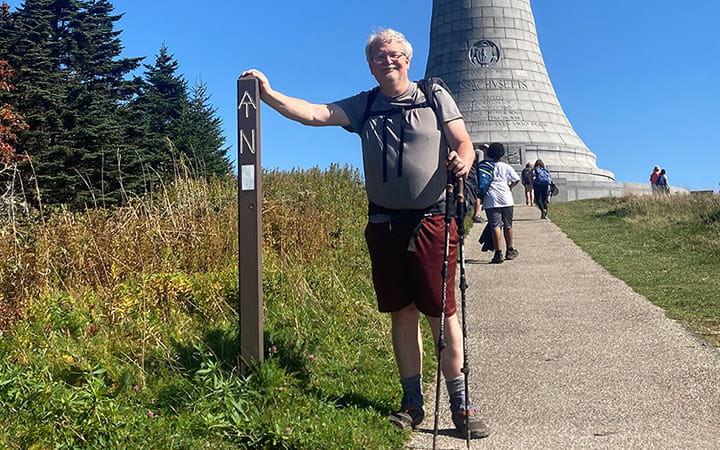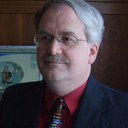NOTE from Stuart: On January 2, 2024, I was asked by the University Hospitals Harrington Heart & Vascular Institute Senior Media Relations Strategist to have my story added to The Science of Health blog and the Heart & Vascular Patient Stories sections of the University Hospitals website for February -- American Heart Month. I provided the photo for the story, and approved the story before it was published on the hospital's website. You can read the original post here:
HCM Patient Returns to Hiking the Appalachian Trail
February 6, 2024
The reason that I chose to publish this HCM recovery blog post today, Wednesday, February 28, 2024, was because the Hypertrophic Cardiomyopathy Association announced that today was HCM Awareness Day.
As we come to the end of American Heart Month 2024, I am glad to have permission from University Hospitals to share their blog post about my HCM recovery story with you on my blog:
HCM Patient Returns to Hiking the Appalachian Trail

Stuart O. Smith, Jr., is a retired website director and experienced backpacker. Now in his mid-sixties, Stuart is a former Appalachian Trail thru-hiker and has been section hiking the Appalachian Trail for 10 years in the hope of completing the entire trail a second time. In early 2023, this man, who hiked mountains, suddenly couldn’t walk up two steps without feeling winded.
Stuart was diagnosed with hypertrophic cardiomyopathy (HCM), a condition affecting the left ventricle (the main pumping chamber) of the heart. In people with HCM, the walls of the left ventricle become thick and stiff. Over time, the pressures in the heart rise. In Stuart’s case, the thickened heart muscle was also intermittently blocking blood flow out to the body.
Symptoms of HCM can include gasping for air, lightheadedness or weakness, and the feeling of a heavy chest or chest pain.
People with HCM may need to make lifestyle changes, such as limiting their activity to adjust for their disease. As the disease progresses, it can cause other health problems. People with HCM are at higher risk for developing atrial fibrillation, which can lead to blood clots, stroke and other heart-related complications. HCM may also lead to life-threatening heart failure.
“I had to quit hiking, which was devastating,” said Stuart.
But soon he regained hope, thanks to his caregivers at University Hospitals Harrington Heart & Vascular Institute. Stuart and his cardiologist, Eiran Gorodeski, MD, MPH, developed a plan.
“I did a lot of research on my own, as well as discussed options with my doctors,” he said. “I knew that the success rate was high with the option I ultimately chose.”
In April of 2023, Stuart underwent open-heart surgery at UH Cleveland Medical Center to address his HCM.
“Stuart’s surgery went very well. We performed a procedure known as septal myectomy where a portion of the overgrown and thickened muscle that is causing obstruction was removed. Stuart’s surgery was uneventful, and he made an excellent recovery,” said Stuart’s cardiothoracic surgeon, Dr. Yasir Abu-Omar, Surgical Director of the Advanced Heart Failure & Transplant Center, and Russ and Connie Lincoln Chair in Cardiovascular Innovation at UH Harrington Heart & Vascular Institute.
“The first day I got home from the hospital, I walked just under a mile. And the second day home from the hospital, I walked just under a mile,” he said.
“Many of his symptoms disappeared,” said Dr. Gorodeski. “The trophy on the top was that he was able to go back to hiking, which honestly, I wasn't sure he was ever going to be able to do. We always hope for the best outcome for our patients, but Stuart exceeded our expectations, which is just wonderful.”
Just two months after his surgery, Stuart was back to day hiking sections of the Buckeye Trail to rebuild his strength. This led to him being able to take a 54-mile backpacking trip on the Appalachian Trail in Massachusetts just five months after his open-heart surgery.
“My endurance returned to how it was previously, like I’d never experienced the surgery or a heart condition,” Stuart said.
Today, Stuart has no HCM symptoms. He says his stamina and strength are great. He’s back to normal, living his life to the fullest.
It feels very strange to be sharing my story for American Heart Month -- February 2024, since it was exactly a year ago that my symptoms started to severely impact my life. (See the January/February 2023 - The Blogs Not Written![]() section of my Blogiversary blog post.) Everything I am able to do today is a direct result of my open-heart surgery on April 27, 2023.
section of my Blogiversary blog post.) Everything I am able to do today is a direct result of my open-heart surgery on April 27, 2023.
To learn more about my experiences from December 7, 2022, through June 4, 2023, please read my first three Hypertrophic Cardiomyopathy blog posts:
,Blog Date: June 11, 2023 - My Hypertrophic Cardiomyopathy Part One: Diagnosis & Medication
Blog Date: June 11, 2023 - My Hypertrophic Cardiomyopathy Part Two: Surgery
Blog Date: June 11, 2023 - My Hypertrophic Cardiomyopathy Part Three: Hospital & Home
(Note the dates on the above three blog posts. In June 2023, I felt I was on my way to recovery, and then decided to make my HCM story public on my blog. I was told that the ". . . first month is the highest risk for post-open-heart-surgery patients needing to return to the hospital.")
This is my sixth HCM blog post and the third "recovery" blog post of my HCM series. See the following two blog posts which were a result of my cardiologist, Eiran Gorodeski MD, MPH, recommending that I share my story on television:
Blog Date: December 28, 2023 - My HCM Part Four: Recovery & A.T. Hike Featured on WKYC TV-3
"It was interesting to learn from his part of the interview that my cardiologist, Dr. Eiran Gorodeski, was not sure I would be able to backpack again. I plan to do even more backpacking in 2024."
As I wrote in my last HCM recovery blog post: "I am already planning more adventures in 2024, which are possible thanks to my successful open-heart surgery at University Hospitals."
Comments
UH Webinar: HCM – The Most Common Inherited Heart Condition
Submitted by Stuart Smith on Sun, 08/25/2024 - 09:02

Stuart O. Smith, Jr., MNO
Blogging at: sosAssociates.com/Blog
Former Cleveland GiveCamp Steering Committee: ClevelandGiveCamp.org/about/#steering
Former Web SIG Cleveland Leader: WebSigCleveland.org
Enlarge Image
In addition to my publishing this HCM recovery blog post on Hypertrophic Cardiomyopathy Awareness Day 2024, my wife and I watched the University Hospitals webinar presented on that day. I want to highly recommend watching it to learn about this common heart condition. FYI, as part of my treatment in 2023 and now in 2024, I have met in person with all but one of the healthcare providers that were featured in this webinar:
Hypertrophic Cardiomyopathy (HCM) – The Most Common Inherited Heart Condition
February 28, 2024
By Judith Mackall, MD, Michael Zacharias, DO, Eiran Gorodeski, MD, MPH, Bradley Lander, MD, and Diane Donato, RN
Hypertrophic Cardiomyopathy (HCM): The Most Common Inherited Heart Condition
University Hospitals
. . . Feb 29, 2024
Hypertrophic cardiomyopathy (HCM) is the most common inherited heart condition, affecting about one in 500 people. However, up to 85% of individuals living with the disease don’t know they have it and remain undiagnosed. HCM causes abnormal thickening of the main pumping chamber of the heart, impacting heart function and rhythm. Many individuals with HCM can lead normal lives, but over time, untreated or undiagnosed HCM can lead to a stroke, atrial fibrillation, heart failure or sudden cardiac death. HCM is highly complex and can also be passed on to other family members. The Hypertrophic Cardiomyopathy Center team of University Hospitals Harrington Heart & Vascular Institute provides an overview of HCM, including treatment options and exercise recommendations. For more information about HCM care, visit https://www.uhhospitals.org/services/heart-and-vascular-services/conditions-and-treatments/cardiomyopathy/hypertrophic-cardiomyopathy
00:00 Start
01:26 What is an Inherited Heart Condition?
04:33 What is Hypertrophic Cardiomyopathy?
12:33 HCM Treatment Options: Medications, Catheter-Based and Surgical Therapies
25:54 Heart Rhythms and HCM: Atrial Fibrillation and Sudden Cardiac Death
40:24 Is It Safe to Exercise with Hypertrophic Cardiomyopathy?
48:40 Navigating the HCM Care Process
I am very grateful for having the opportunity a year ago on April 27, 2023, to have a septal myectomy (open-heart surgery) as treatment for my hypertrophic cardiomyopathy. My surgery was performed by Dr. Yasir Abu-Omar, the Surgical Director of the Advanced Heart Failure & Transplant Center at University Hospitals Harrington Heart & Vascular Institute.